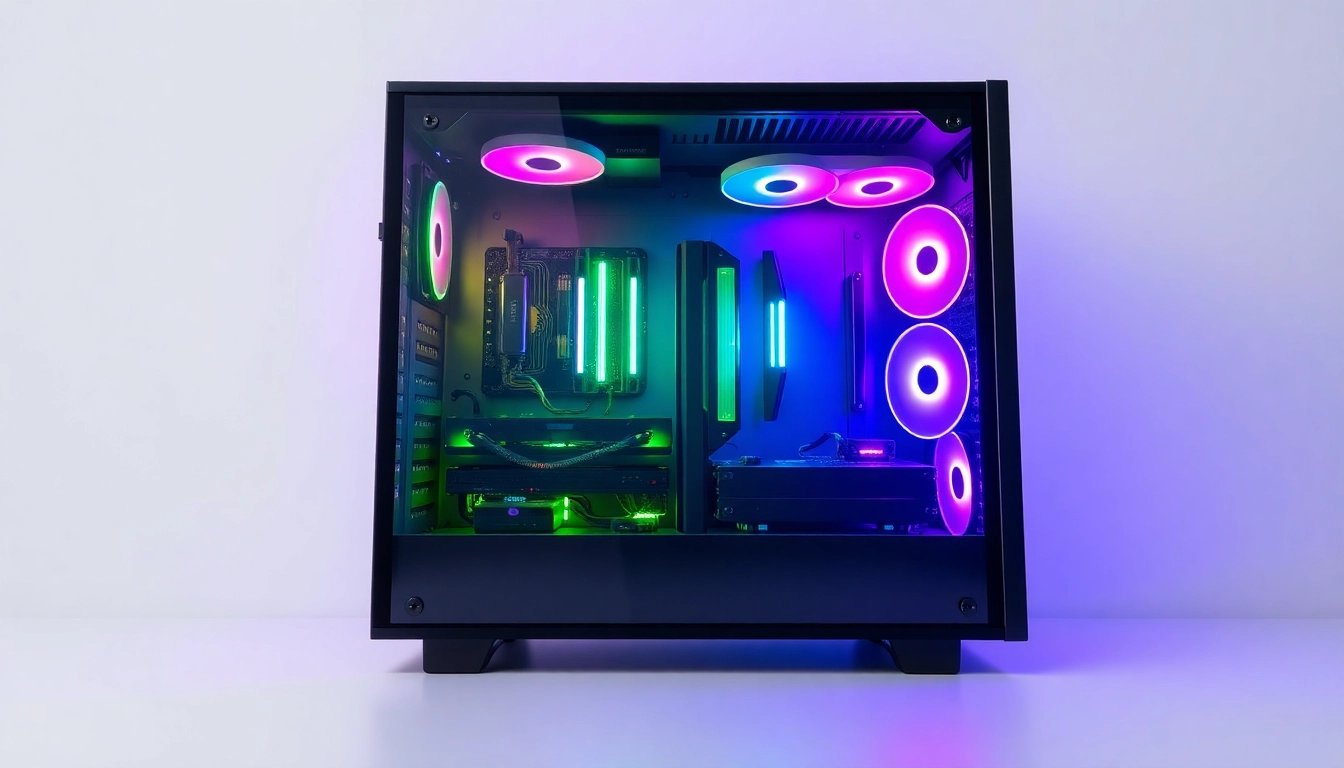Understanding the Role of a PC CASE Manufacturer
In the realm of computer hardware, the PC case serves as the fortress for your internal components, ensuring they remain protected and organized. The PC CASE Manufacturer plays a crucial role in the design and fabrication of these structures. High-quality cases not only enhance the aesthetics of a build but also improve functionality and performance by providing necessary features such as cooling, compatibility, and expansion possibilities.
What Defines a High-Quality PC Case?
A high-quality PC case meets several key criteria, which include structural integrity, thermal performance, and user-friendly design. Below are essential characteristics that define the quality of a PC case:
- Material Quality: Premium cases are typically made from high-grade steel, aluminum, or tempered glass. These materials are durable and offer aesthetic appeal.
- Cooling Efficiency: High-quality cases improve airflow with strategically placed vents and fan mounts, which are essential for keeping components cool.
- Tool-less Design: Ease of assembly is an important factor. Many high-end cases utilize a tool-less design that simplifies the installation of components, making building easier for novices.
- Usability: Features like cable management systems, drive bays, and dust filters enhance the overall user experience and system maintenance.
- Expansion Options: A good case should allow for future upgrades with ample space for additional hard drives, graphics cards, and cooling systems.
Key Materials Used by PC CASE Manufacturers
Choosing a PC case often revolves around the materials used in its construction, which can significantly impact durability and functionality. The following materials are widely utilized by PC case manufacturers:
- Steel: Known for its strength and rigidity, steel is commonly used for the frame of mid-tower and full-tower cases. It also provides excellent electromagnetic shielding.
- Aluminum: This lightweight material offers a premium look and feel while ensuring durability. Its inherent properties allow for better heat dissipation compared to steel.
- Tempered Glass: Increasingly popular among enthusiasts, tempered glass panels provide a modern aesthetic, allowing users to showcase their builds while ensuring safety and resistance to scratches.
- Plastic: Used primarily for panels and components, high-quality plastics can contribute to a lightweight structure without compromising on form or function.
Importance of Airflow and Cooling Solutions
Effective airflow is critical for the optimal performance of a PC. High-quality cases incorporate design elements that enhance airflow, thereby improving thermal performance. Below are essential strategies that PC case manufacturers use:
- Fan Placement: Strategic placement of fans and intake/outtake vents ensures effective circulation and minimizes hotspots.
- Radiator Support: Many cases support liquid cooling systems, which not only enhance cooling efficiency but also open up design options for builders.
- Dust Filters: Integrated dust filters trap dirt and debris while allowing airflow, minimizing overheating and maintenance needs.
Popular PC CASE Manufacturers in the Market
Overview of Leading Brands
The market is ripe with PC case manufacturers, each offering unique features and styles. Notable manufacturers include:
- Corsair: Renowned for their sleek designs and exceptional cooling options. Corsair cases often come with features catering to both novice and professional builders.
- NZXT: Known for their focus on minimalistic design, NZXT cases are often favored by gamers for their aesthetic appeal and superior thermal performance.
- Fractal Design: They emphasize functionality and customization. Their cases feature modular designs, appealing to those looking for flexibility.
- Lian Li: Best known for their all-aluminum cases, Lian Li products combine aesthetic luxury with lightweight durability.
Comparison of Features Offered
When evaluating different PC case manufacturers, it’s important to consider the unique features they offer:
| Manufacturer | Material Quality | Cooling Options | Customization | Price Range |
|---|---|---|---|---|
| Corsair | High-grade Steel/Glass | Multiple fan/radiator support | RGB Lighting, Modular Panels | $$$ |
| NZXT | Steel/Glass | Liquid cooling support | Custom panels, RGB options | $$ |
| Fractal Design | Steel/Aluminum | High airflow design | Modular system | $$$ |
| Lian Li | Aluminum | Excellent thermal management | Customizable layouts | $$$-$$$$ |
Customer Feedback and Brand Impact
Consumer sentiment plays a significant role in brand reputation. Reviews reflect user experiences and can help potential buyers make informed decisions. Positive feedback typically attributes quality to:
- Ease of assembly and cable management.
- Durability and how a case withstands daily use.
- Customer service experiences with manufacturers.
Additionally, community forums and review sites often serve as platforms for potential buyers to gain insights about the product, enabling them to choose the right case for their needs.
Factors to Consider Before Purchasing a PC Case
Size and Compatibility with Components
One of the first considerations when purchasing a PC case is its size and compatibility. The case must accommodate the specific components of the build, including:
- Motherboard Size: Confirm the case supports your motherboard size—ATX, Micro-ATX, or Mini-ITX.
- GPU Length: Ensure the case can house your graphics card’s length, particularly for high-performance GPUs.
- Cooling System: Account for the cooling system you intend to implement, be it air or liquid cooling, and whether the case supports it.
Design Aesthetics and Customization Options
Today’s PC builders often desire cases that reflect their personal style while simultaneously meeting functional requirements. Aesthetics play a major role, as do features that allow for customization. Consider the following:
- Color Options: Many manufacturers offer various colors and finishes, allowing personalization.
- Tempered Glass Panels: A growing trend is the incorporation of see-through panels for a showcase effect.
- RGB Lighting: Lighted cases add flair and can be synchronized with internal components for a cohesive look.
Price Comparison Across Manufacturers
Price varies significantly based on brand, material, and features. A effective budgeting strategy involves analyzing features against price points. Factors to be aware of when considering cost include:
- Brand Reputation: Established brands may command higher prices but often ensure quality.
- Material Choices: Cases made from premium materials like aluminum or tempered glass typically cost more than basic steel options.
- Included Accessories: Higher price points may include added features like pre-installed fans or RGB lighting systems.
Trends in PC CASE Manufacturing
Rise of Sustainable Materials in PC Cases
As gaming becomes more mainstream, environmental considerations are increasingly influencing purchasing decisions. Manufacturers are slowly shifting toward sustainable materials. This includes:
- Recyclable Materials: Innovatively using recycled metals and plastics in the production of cases.
- Minimal Packaging: Reducing excess packaging waste, contributing to sustainability efforts.
Technological Innovations Shaping the Future
Continuous innovations are transforming the landscape of PC cases. Current trends to watch for include:
- Smart Case Features: Cases with integrated monitoring tools that provide information on component temperatures and airflow.
- Improved Cable Management: Designs that facilitate superior cable routing that enhances airflow and aesthetics.
- Hybrid Cooling Systems: New designs for integrating both liquid and air-based cooling systems more effectively.
Community-Driven Design Initiatives
With the growth of DIY communities and forums, feedback from users directly impacts design decisions. Many manufacturers are now:
- Engaging with Communities: Actively incorporating user feedback into their products, which fosters a sense of loyalty and community.
- Gaming Customizations: Offering limited edition cases that appeal to gamers through thematic designs or collaborations with popular franchises.
Implementing Best Practices for PC Build with Cases
Steps for Choosing the Right PC Case
Selecting the right PC case can be a daunting task, but taking the following steps will simplify the process:
- Define your goals: Based on gaming, graphic design, or general use.
- Research brands and materials: Look for reputable manufacturers that suit your budget and preference.
- Check compatibility: Ensure size and thermal solutions align with your components.
- Consider aesthetics: Select a design that fits your style.
Installation Tips for PC Cases
Proper installation in a PC case is key to ensuring longevity and performance:
- Use Proper Tools: A tool kit simplifies the installation of screws and mounting brackets.
- Follow Layouts: Use the motherboard’s manual to guide connectivity and placement of components.
- Tidy Cable Management: Organize cables as you build to enhance airflow and maintain aesthetics.
Maximizing Performance Through Space Optimization
The organization of your internal components can significantly affect performance. Few optimized storage strategies include:
- Separating Airflow: Utilize space to maintain a clear path for airflow, preventing overheating.
- Strategic Hardware Placement: Position heat-producing components like the GPU away from sensitive parts.
- Utilizing Custom Fan Configurations: Experiment with different fan placements to find optimal airflow setup.



